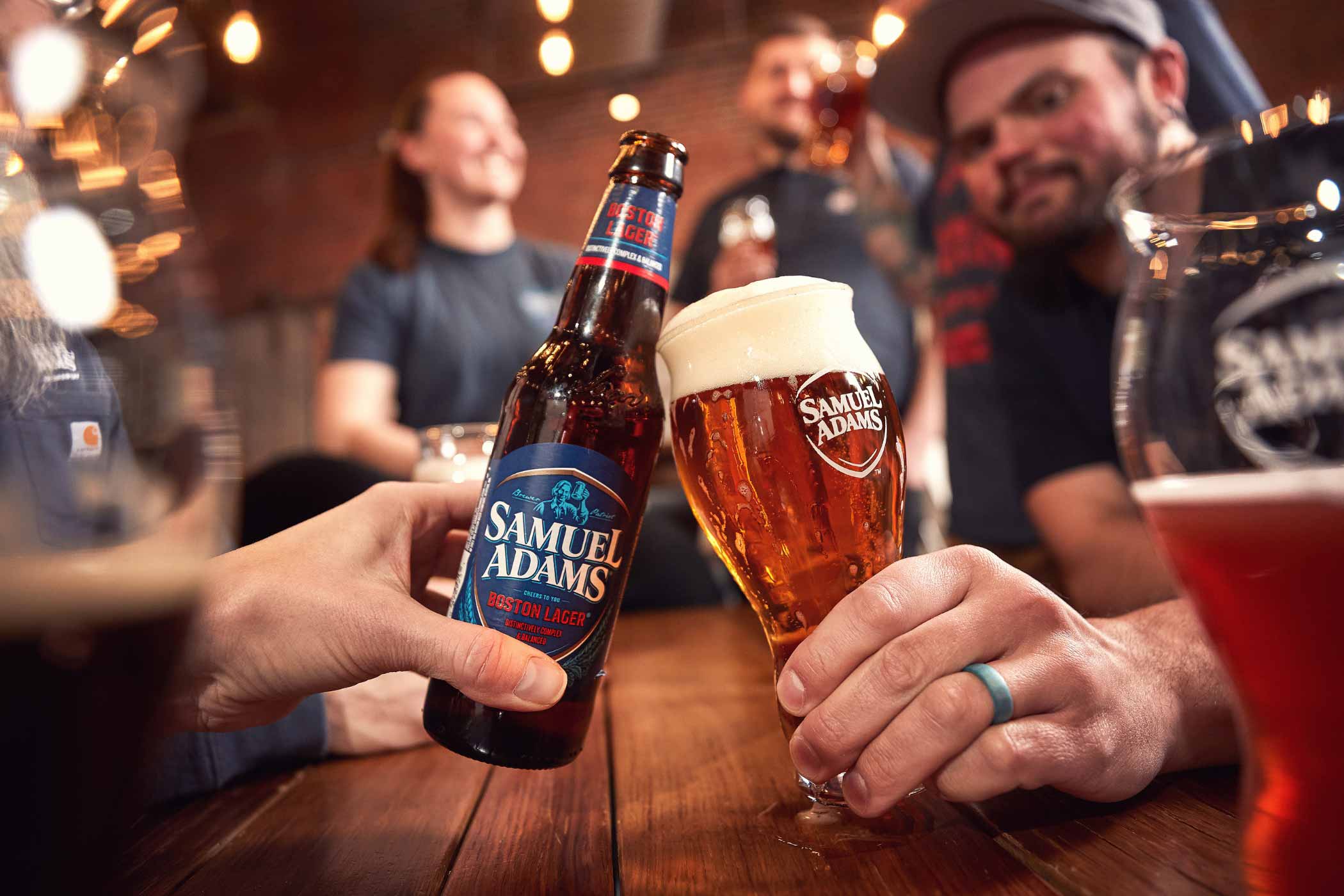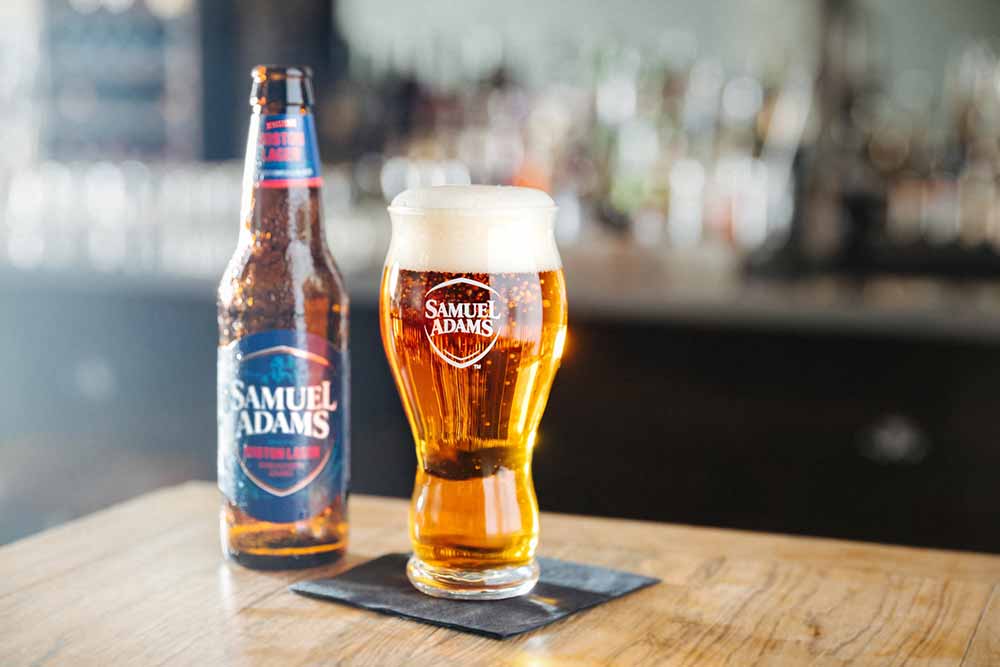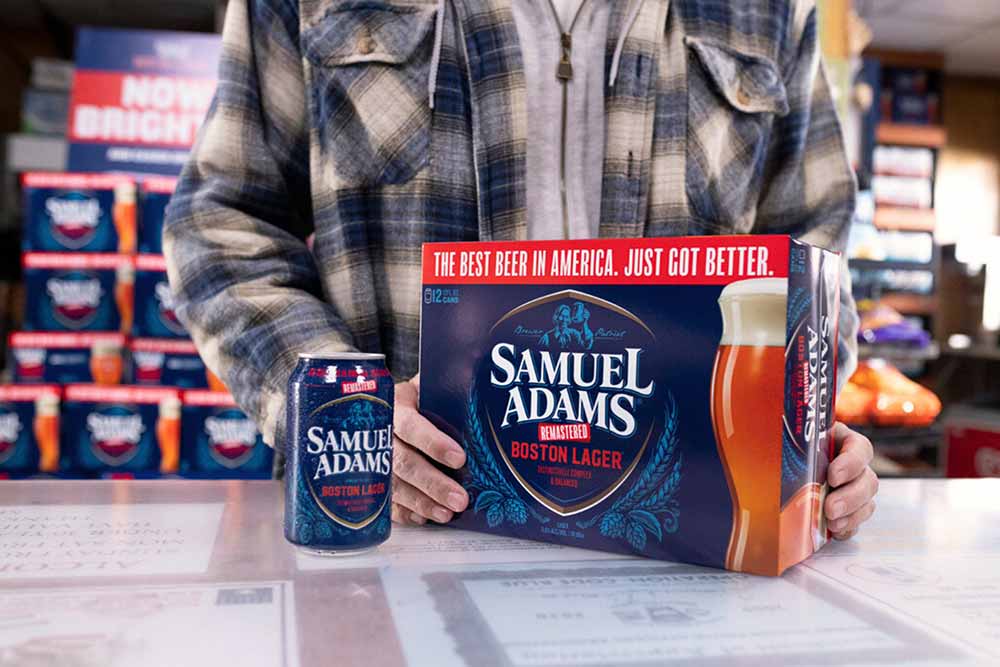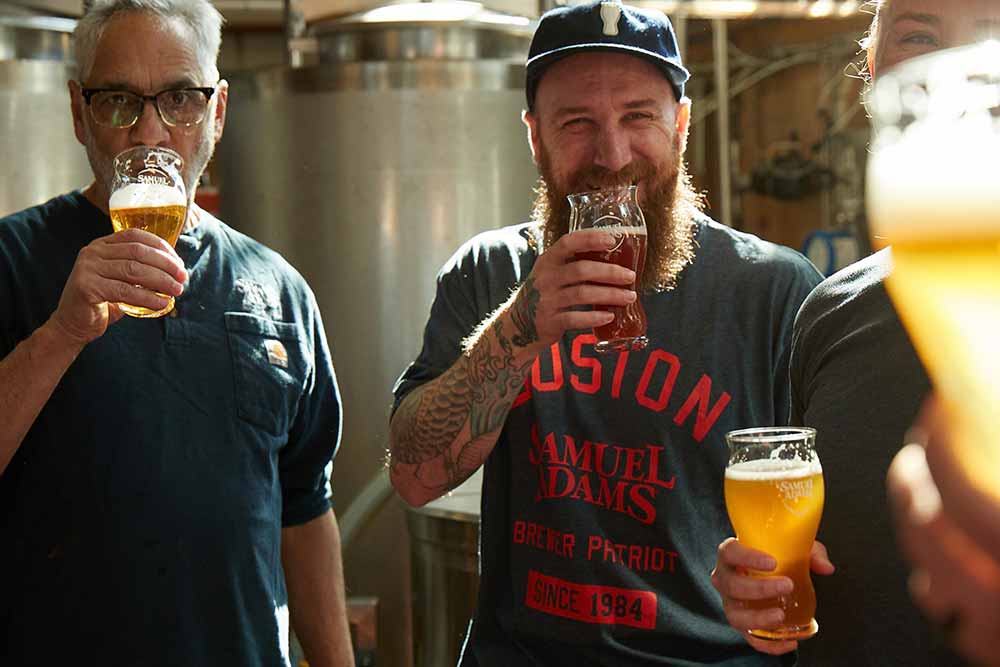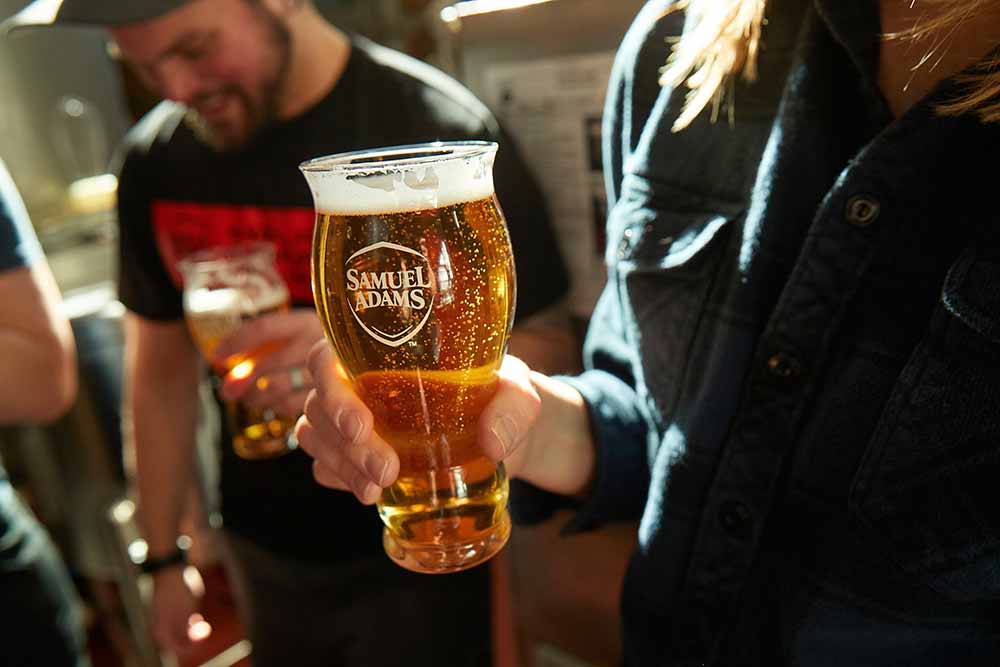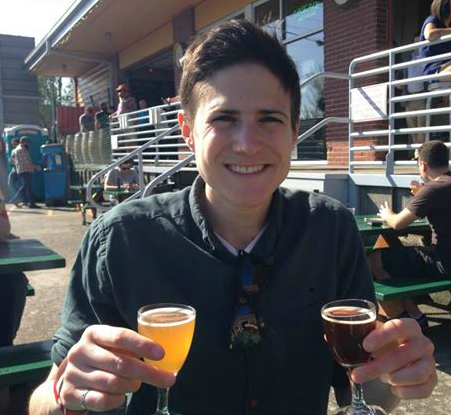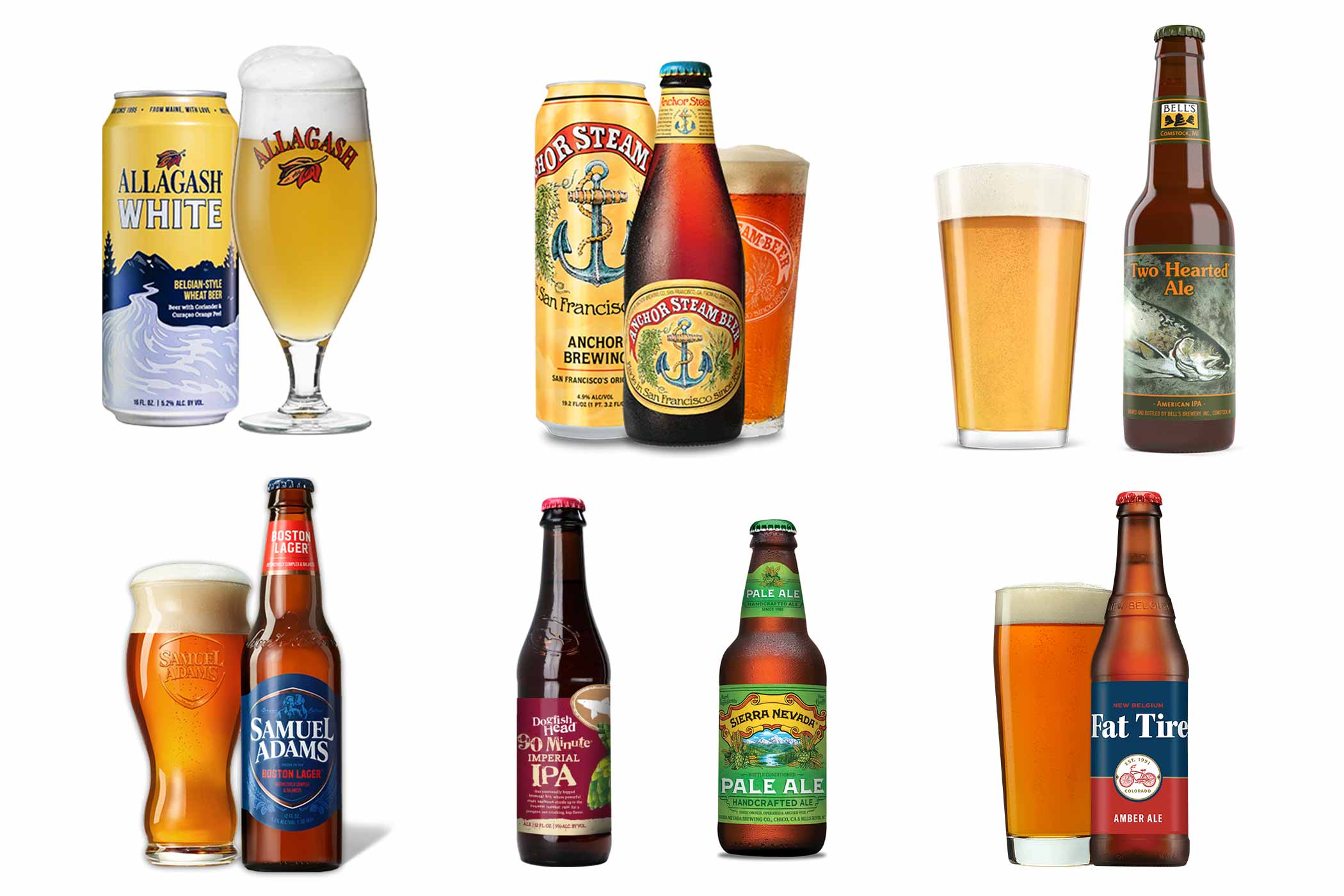Shop
Samuel Adams Boston Lager Remastered: Making the Best Beer in America a Little Better
Hitting all the right notes.
This is a paid, sponsored post presented by our friends at Samuel Adams.
Why do we play a favorite song over and over and over again? Maybe it’s the mesmerizing lyrics that resonate with us or the harmonies that make our hearts beat a little faster. It could be that the guitar solos speak to us, or the high tenor notes hit us hard. But really, it kind of all boils down to this simple fact: We love it. Does the reason really matter? The song speaks to us in one way or the other, and we want to play it until we’re blue in the ears, if you know what we mean.
But what if we could make that classic song even better?
If we could take Imagine from John Lennon or Bohemian Rhapsody by Queen, tune them up, make them clearer, shine brighter, and sound richer.
Earlier this year, Boston Beer Co. did just that with its revered Boston Lager, launching Boston Lager Remastered, an updated version of a time-honored tradition.
Without a doubt, Boston Lager remains one of the most iconic American beers. So how do you turn a classic into a contemporary?
By making the best beer in America just a little better.
A smoother, brighter version of the original, Boston Lager Remastered promises to keep an almost-forty-year-old beer revolutionary for decades to come.
Boston Lager, One of the Most Revolutionary American Beers
Back when the term craft beer didn’t exist, when imports and American light lagers dominated, Boston Beer Co. Founder Jim Koch homebrewed his great-grandfather’s recipe, passed down to him from his dad, in his kitchen.
“I didn’t know beer could taste that way,” says Koch, who sourced the ingredients and supplies from a homebrew warehouse in the back of a canoe store in Framingham, MA, along with a supply depot a guy ran out of his garage.
A fairly difficult process involving brewing techniques like decoction and krausening (adding fresh wort to beer before, during, or after fermentation to carbonate the beer), Koch couldn’t replicate the recipe completely. “But when I first tasted it, it was like, oh, wow, I’ve never had this before,” Koch recalls. “The amount of flavor and complexity of the flavor and the balance of the flavor were exquisite.”
Koch knew he had created something special. He just didn’t know yet that he had created something revolutionary.
Launching on Patriot’s Day (April 15th) in 1985, Boston Beer touted its flagship Samuel Adams Boston Lager to the masses in Massachusetts.
A bottom-fermented beer in a land of top-fermented ones, Boston Lager gave drinkers “this wonderful balance between the body and sweetness of the malt and the spiciness and bitterness of the hops,” says Koch.
Unlike any other lager out there, Boston Lager picked up a nod from the nascent Great American Beer Festival (GABF) as the best beer in America a mere four months after it hit the market.
“I realized I wasn’t the only one who thought this was something unique and special,” says Koch. “[This beer] helped ignite the whole craft beer revolution.”
Boston Beer Co. Assistant Manager of New Product Development Rich Ferrell calls it “the right beer at the right place at the right time.”
Koch dropped Boston Lager into Boston, a city steeped in history, with a name and symbol drawing on American traditions. He also launched the Vienna lager right at the crux of a nascent craft movement. And, honestly, he brewed a damn fine beer toeing the line between crafty complexity and beautiful balance.
“This is a beer that is American, should be made in America, and we’re going to name it after this revolutionary [person],” explains Eryn Bottens, Boston Beer Co’s Brewing Manager of New Product Development. “We’re going to start a craft beer revolution.”
And Koch did. Whether intentionally or not, he fired Boston Lager out of a cannon with a resounding boom that has echoed for decades.
Today, the key for Boston Beer: to never let the echo fade.
Boston Lager Remastered: A Relentless Pursuit of Perfection
At Boston Beer, Koch has a motto that everyone who works at the brewery adopts: “a restless dissatisfaction with the status quo,” says Bottens. A ten-year veteran at Boston Beer, Bottens believes strongly enough in this ethos to keep a sticky note with the saying taped to his monitor.
When it comes to Boston Lager specifically, Koch says, “The fundamental idea is there is a perfect Boston Lager [out there], but we haven’t made it yet, and we will keep trying until we do so.”
Over the past thirty-eight years, Boston Beer constantly experimented with not the ingredients in Boston Lager but the process, tweaking, twiddling, and perfecting.
For instance, fifteen to twenty years ago, Koch says they realized the characteristic Tettnang and Hallertau Mittelfruh hops they harvested from Bavarian growers for Boston Lager expressed better when picked later.
“For centuries, German hop growers have harvested their hops when they were at their visual peak, at their most beautiful, nice green,” says Koch. “But we realized it was not a beauty contest. If you left them on the vine another, call it ten days, maybe two weeks, they actually developed more aromatics, even though they didn’t look as good.”
So Boston Beer started using hops picked later to maximize their flavor and aroma.
Similarly, with the malt, in Boston Lager, you’ll find Caramel 60 along with a Samuel Adams two-row pale malt blend. What is the latter, you ask?
Literally, Boston Beer commissioned a custom malt blend that only they use for Boston Lager.
Boston Lager Remastered culminates years of tinkering and experimenting into a smoother, brighter, better-tasting beer.
Ferrell, who has been with Boston Beer Co. for about seven years, likens the updated beer to remastering a record (hence the name).
“It’s the same reason why you can take a recording of Abbey Road from 1969 and remaster it in 2019,” he says. “It’s the same recording, but you can hear the bass better; the drums are louder; the guitars sound nicer; everything is in more harmony and balance.”
Following this analogy, Koch says it’s actually more about what they’ve taken away, “The snaps, the pops, and the hiss you used to get are gone.”
If music isn’t your thing, Koch offers up an analogy made by woodworker and former Boston Beer Vice President, Brewing & Quality, David Grinnell. “You make a piece of furniture, you get the sandpaper, and you sand it down, and it’s pretty smooth,” Koch shares. “But then you can get a finer grit, keep sanding, and get smoother still.”
You can see how this quickly becomes an endless pursuit of perfection.
However you describe it, Ferrell says, “[Boston Lager Remastered] takes the original source recording and reduces the signal-to-noise, so you can taste the recipe and those ingredients better.”
So, What Exactly Did Boston Beer Change With Boston Lager Remastered?
As we mentioned, Boston Beer didn’t change any of the ingredients from the original Boston Lager recipe.
Instead, they updated certain brewing processes.
For example, the biggest change is how they treat the water for the mash, according to Bottens.
“[Before] we would adjust our pH with salts, and now we use a process called bioacidification, where we actually make our own acid in-house using brewing ingredients,” he says.
Actually a traditional German brewing technique, this sour fermentation with lactobacillus creates lactic acid that’s added to the beer to drop out some of the “rougher flavors,” as Koch calls them.
From the very beginning, Boston Lager has been a beer that adheres to the Reinheitsgebot or German Beer Purity Law which states that beer in Germany can only include four ingredients: water, barley, hops, and yeast.
“So, in a way, we’re being more Reinheitsgobot or more traditional than we used to be with Boston Lager,” says Bottens. “There are only four ingredients that go into this, we could sell this in Germany if we wanted!”
For Bottens, this sour fermentation not only helps make the brewing process more efficient, but it also has a significant effect on the mouthfeel. “It’s just a much softer beer,” he says.
Boston Beer Co. Senior Brewing Manager, New Product Development, Shelley Smith calls the changes this sour wort makes “a cleaner bitterness; it’s a little less astringency, and it really just allows the beer to shine through more fully.”
Smith outlines that with Boston Lager Remastered, they also removed a filtration step. “We spend all this time putting these really high-quality ingredients into this beer, so we don’t want to strip all the flavor out,” she says.
Now these premium ingredients shine and sing a little louder, in other words, without those snaps, crackles, hisses, and pops.
“It’s more like, I’m going to have another one of these, and I might not have had another one before because it’s that much brighter, that much more sessionable,” says Ferrell. “It’s going to cause someone to reach for another one when maybe they wouldn’t have last time.”
Reaching for Boston Lager Remastered Over and Over and Over
At the moment, Boston Lager Remastered tastes “brighter, cleaner, fresher,” says Koch. “It just has a sparkle to it that was missing before.”
Coming from a man who hypothesizes he’s tried 50,000 Boston Lagers over the last almost four decades, that’s high praise.
But the pursuit of perfection isn’t over. And perhaps that very phrase is sort of a snake eating its own tail: The journey never really ends, does it?
Much like a favorite song that you want to play on repeat, Boston Lager Remastered seeks to capture that relentless attraction.
And if that means updating Boston Lager again, the brewery will.
“We’ve always been in pursuit of the best beer we can make, and if this isn’t it, then this isn’t it, and we’ll keep looking,” says Bottens.
Although Bottens concedes that they’re pretty happy with where the beer is right now, that restless dissatisfaction with the status quo drilled into the Boston Beer team always persists.
“I’m never satisfied until we can prove that it’s good,” he says.
Smith echoes that sentiment. “Constantly, is there anything else we could do? Is there anything else we could try?” she says. “In Jim’s mindset, he’s never satisfied with good enough … so there is this constant pursuit of something better, of improvement, of change, of trying different things.”
Always looking to the future, Koch says, “Legacies don’t just continue to exist like dirt, rocks, and trees; it has to be a living thing. If you don’t keep trying to make it better, there’s a natural tendency for people to start making compromises.”
Which Boston Beer will never do.
Koch says that he’s happiest when Boston Beer pushes the envelope in new ways, bringing things to the drinker they’ve never tasted before.
Just like when he first brewed Boston Lager.
So what does the future of Boston Lager Remastered look like?
Perhaps Koch captured it best when we asked him if there will ever be a perfect Boston Lager: “That’s a really good question,” he mused. “I don’t know because we haven’t found it yet.”

